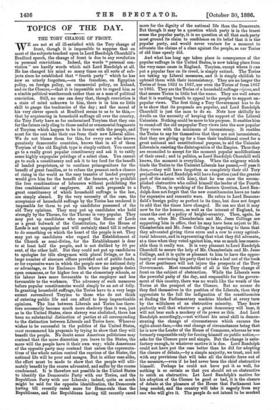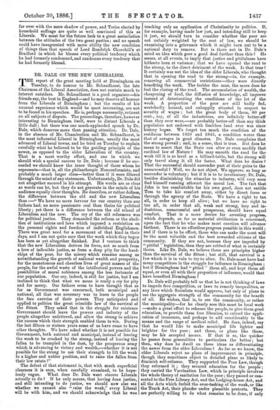TOPICS OF THE DAY.
THE TORY CHANGE OF FRONT.
WE are not at all ill-satisfied with the Tory change of front, though it is impossible to suppose that on most of the subjects touched upon in Lord Randolph Churchill's Bradford speech, the change of front is due to any revolution in personal convictions. Indeed, the words "personal con- viction are hardly words which suit Lord Randolph at all. He has changed his mind so many times on all sorts of sub- jects since he established that "fourth party " which he has now so utterly forgotten,—on the franchise, on Egyptian policy, on foreign policy, on commercial policy, on Ireland, and on the Closure,—that it is impossible not to regard him as a nimble political weathercock rather than as a man of political conviction. Still, no one can deny that, though conviction is a state of mind unknown to him, there is in him no little skill to gauge the tendencies of the day ; and the moral of his very clever speech at Bradford seems to us to be this,— that by acquiescing in household suffrage all over the country, the Tory Party have so far undermined Toryism that they can for the future only cling to those useful or ornamental fragments of Toryism which happen to be in favour with the people, and must for the rest take their cue from their new Liberal allies. We do not blame them for this, for every one who knows genuinely democratic countries, knows that in all of them Toryism of the old English type is simply extinct. You cannot go to a really great popular constituency and ask it to ratify some highly unpopular privilege of a select class. You cannot go to such a constituency and ask it to tax food for the benefit of landed proprietors, or to continue primogeniture for the benefit of great families, or to refuse the peasant such a chance of rising in the world as the easy transfer of landed property would give him for the benefit of the farmers, or to prohibit the free combinations of labourers without prohibiting the free combinations of employers. All such proposals to a great constituency of which household suffrage is the law, are simply absurd. By the very necessity of the case, the acceptance of household suffrage by the Tories has rendered it impossible for them to put up candidates possessed of the old Tory opinions. They may put up candidates who hold strongly by the Throne, for the Throne is very popular. They may put up candidates who regard the House of Lords as a great bulwark of the Constitution, for the House of Lords is not unpopular and will certainly stand till it refuses to do something on which the heart of the people is set. They may put up candidates who regard the Establishment of the Church as semi-divine, for the Establishment is dear to at least half the people, and is not disliked by 50 per cent, of the other half. But they could not put up candidates to apologise for idle clergymen with plural livings, or for a large number of sinecure offices provided out of public funds, or for expensive wars in which the people saw no national duty or advantage, or for Enclosure Bills where the people desire open commons, or for higher fees at the elementary schools, or for labour laws more favourable to the employer and less favourable to the workmen. The advocacy of such measures before popular constituencies would simply be an act of folly. In granting household suffrage, the Tories have to a very large extent surrendered Toryism to those who do not think of entering public life and can afford to keep impracticable opinions. The line between Liberals and Tories has there- fore necessarily become much more shadowy than it was, just as in the United States, since slavery was abolished, there has been no substantial distinction of parties at all corresponding to the distinction between Liberals and Tories here. Whoever wishes to be successful in the politics of the United States, must recommend his proposals by trying to show that they will benefit the people. No doubt some American politicians may contend that the more discretion you leave to the States, the more will the people have it their own way; while Americans of the opposite party may contend that unless the representa- tives of the whole nation control the caprices of the States, the national life will be poor and meagre. But in either case alike, the effort must be made to show that the people will ulti- mately benefit by the course advocated, and suffer by the course condemned. It is therefore not possible in the United States to identify the Democratic Party with our Tories, and the Republican Party with our Liberals ; indeed, quite as much might be said for the opposite identification, the Democrats having till recently eared more for Home-rule than the Republicans, and the Republicans having till recently cared
more for the dignity of the national life than the Democrats; But though it may be a question which party is in the truest sense the popular party, it is no question at all that each party must ground its claim to confidence on its belief that it is the popular party, and would never venture for a moment to advocate the claims of a class against the people, as our Tories of old time openly did.
And what has long ago taken place in consequence of the popular suffrage in the United States, is now taking place from the very same cause in England. Toryism, except where it can put a popular face on its creed, is simply extinct. The Tories are taking up Liberal measures, and it is simply childish to, upbraid them with their inconsistency. They are no longer the Tories of from 1832 to 1867, nor even the Tories of from 1867 to 1885. They are the Tories of a household suffrage reginze, and that means Tories in little but the name. They are well aware that it is wasting breath to appeal to the people to support un- popular views. The first thing a Tory Government has to do is to show that its proposals are popular, and Lord Randolph Churchill is just the man to do so. Note how skilfully he dwells on the necessity of keeping the support of the Liberal Unionists. Nothing could be more to his purpose. It enables him to round-off the old unpopular Tory views into the new popular Tory views with the minimum of inconsistency. It enables the Tories to say for themselves that they are not inconsistent, that they are giving up for a time their traditional creed for a great national and constitutional purpose, to aid the Unionist Liberals in resisting the disintegration of the Empire. Thus they are reconciled to accept for the moment popular modifications of their creed ; and in politics, as Lord Randolph Churchill well knows, the moment is everything. When the exigency which binds the Tories to the Unionist Liberals has passed,—if pass it does,—they will have forgotten as completely their old Tory prejudices as Lord Randolph will have forgotten (and the greater part of the nation with him), that he was once the accom- plished obstructive who called himself the leader of the Fourth Party. Thus, in speaking of the Eastern Question, Lord Ran- dolph does not forget that the new constituencies have no taste for expensive and romantic wars. He refers to Lord Beacons- field's foreign policy as perfect in its time, but does not forget to add that the times have changed. He can see that it may now be for the honour, as well as the interest of England, to count the cost of a policy of knight-errantry. Then, again, he can see, when Mr. Chamberlain and Mr. Jesse Collings are supporting him in office, that he may have been unjust to Mr. Chamberlain and Mr. Jesse Collings in imputing to them that they advocated giving three acres and a cow to every agricul- tural labourer, and in representing that what they did advocate, at a time when they voted against him, was so much less reason- able than it really was. It is very pleasant to Lord Randolph Churchill to secure the help of Mr. Chamberlain and Mr. Jesse Collings, and it is quite as pleasant to him to have the oppor- tunity of convincing his party that to take a leaf out of the book of these gentlemen will not injure the prospects of the Tory Government. Most remarkable of all is the Tory change of front on the subject of obstruction. While the Liberals were the powerful party of the day, and responsible for the govern- ment of this country, there was no wrath like the wrath of the Tories at the prospect of the Closure. But no sooner do they find themselves in the position of the Liberals, than they appreciate to the full the indignation of the constituencies at finding the Parliamentary machine blocked at every turn by the wilfulness of an obstructive minority. They know perfectly well that whatever a great democracy will bear, it will not bear such a mockery of its power as this. And Lord Randolph accordingly,—not without his usual skill in demon- strating the change of circumstances which excuses the right-about-face,—the real change of circumstances being that he is now the Leader of the House of Commons, whereas he was formerly responsible only for forcing himself on public notice,— asks for the Closure pure and simple. But the change is satis- factory enough, to whatever motive it is due. Lord Randolph could not have put the case better than he did for adopting the closure of debate,—by a simple majority, we trust, and not with any provisions that will take all the drastic force out of the measure,—even if he had never been the chief obstructive himself. Perhaps he could not have put it so well, for nothing is so certain as that you should set an obstructive to catch an obstructive. Let Lord Randolph's motive for his adoption of the Closure be good or bad, it is the closure of debate at the pleasure of the House that Parliament has long needed, and the country will take it eagerly from any one who will give it. The people do not intend to be mocked
for ever with the mere shadow of power, and Tories elected by household suffrage are quite as well convinced of this as Liberals. We must for the future look to a great assimilation between the attitudes of the two great parties ; and no speech could have inaugurated with more ability the new condition of things than that speech of Lord Randolph Churchill's at Bradford in which he blesses every political tendency which he had formerly condemned, and condemns every tendency that he had formerly blessed.





































 Previous page
Previous page